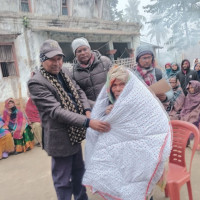- Thursday, 8 January 2026
Chronic budget delays hamper local governments
Kathmandu, July 13: All the local governments across the country are well-aware that they have to announce their budget for the upcoming fiscal year by Ashadh 10 of Nepali calendar (June 24 in case of this year) which is a legal provision in the Intergovernmental Fiscal Arrangement Act, 2074.
According to it, the village executive and municipal executive shall at least submit (if not get ratified by the assembly of the local body) the estimates of revenues and expenditures (budget) of next fiscal year within Ashadh 10.
But at least 49 local governments, including the federal capital Kathmandu Metropolis, have not announced their budgets for the upcoming Fiscal Year 2025/26 by Friday, according to the Ministry of Federal Affairs and General Administration (MoFAGA).
However, statistics from the National Association of Rural Municipalities in Nepal (NARMIN) and Municipal Association of Nepal (MuAN) are different with 13 rural municipalities and 23 municipalities failing to announce their budget even after at least 10 days of the stipulated date. Kalanidhi Devkota, Executive Director of MuAN, said the association is set to update the statistics on Sunday and expected that some remaining municipalities had submitted their budgets at their assemblies.
Although there is a calendar to formulate the annual budget, the MoFAGA had reminded the local governments to report their budget progress at the Ministry's portal on June 22. But by Friday, July 11, at least 216 (28.69 per cent) local governments have not updated information in the portal which means the official figure of local bodies that announced the budget is 537.
There are 753 local governments in Nepal comprising of six metropolitan cities, 11 sub-metropolises, 276 municipalities and 460 rural municipalities.
With 15 municipalities and nine rural municipalities yet to announce their budgets for the upcoming year, Madhes has become the worst performer among the provinces in the country (see table).
In Bagmati, four municipalities and one rural municipality are yet to announce their budgets while the number is four in Lumbini. Koshi, Gandaki and Karnali have one each local body being unable to announce their budget. Sudurpaschim is the only province that has all of its local bodies ready with the budget for the next year.
District-wise, Dhanusha has five municipalities that haven't announced their annual budget for the next fiscal followed by Saptari (4) and Rautahat (3).
Meanwhile, many municipalities' executives have only presented their budget statement to the local assemblies but the latter are yet to endorse it. Without the local assembly endorsing the budget, it couldn't be executed.
Chronic problem
Missing budget deadline has become a chronic challenge for many local governments. Last year, out of 753 local bodies, 103 couldn't present their budget for the current FY 2024/25 even after the end of the first quarter of the year. According to the statistics from the MoFAGA in last September, 47 municipalities from Madhes were without budget by then.
Likewise, 154 local bodies couldn't get their budget for FY 2023/24 endorsed by the local assembly even after the start of the new fiscal year. That year as well, local bodies in Madhes performed poorly with 63 local bodies failing to announce their budget after 25 days of the deadline. Karnali had four local bodies without budget then while Koshi had 29, Bagmati 24, Sudurpaschim 13 and Gandaki seven.
Similarly, about 193 local bodies couldn’t present their budget for FY 2020/21 by July 29, about five weeks after the deadline set by the law.
Kathmandu tales
The Federal Capital city Kathmandu Metropolis couldn't announce its budget until now and Mayor Balendra Shah convened its executive meeting after six months on Friday to decide the unveiling of the budget on Sunday afternoon.
It is said that the primary reason behind this was the ongoing dispute between Mayor Balendra Shah and the federal government over the controversial suspension and reinstatement of the KMC's Chief Administrative Officer Saroj Guragain, which resulted in a prolonged disruption in the city’s internal governance.
As a result, Mayor Shah could not convene meetings of the resource estimation and budget ceiling determination committee, the municipal executive, and the assembly, which are essential for finalising and approving the budget. Meeting of the municipal executives should be called every month.
Political reasons
According to local body experts and representatives, the budgets are delayed due to political conflict between the political parties at the local level or among the elected representatives.
"We observed that the budget has become the victim of the internal political conflict. There is a general tendency of non-cooperation among the political parties at the local level," said Prakash Tiwari, Chairman of Arjunchaupari Rural Municipality in Syangja district.
He said that no problems have been witnessed due to the lack of technical expertise, it's only the human-political reason behind it.
For example, Kamala Municipality of Dhanusha district couldn’t present its budget during the first half of the fiscal year because the opposition party boycotted the government policy and programmes and filed a case at the High Court in Janakpur.
Mayor Bishweshor Yadav and Deputy Mayor Shiladevi Mandal are from Nepali Congress and opposition Janata Samajwadi Party obstructed the budget as its candidates were defeated by them.
President of MuAN, Bhim Prasad Dhungana, expressed worries over the budget obstructions and said that the political parties that are active at the local level must remember that there is no concept of opposition there.
"The mayor and deputy mayor are the leaders who must think beyond their party-line and about the people," he said. "If any local body failed to ratify its budget by mid-July there would be problems in running the day-to-day operations, the municipal executive can sanction the development budgets. Even the salary distribution is obstructed."
Dhungana maintained that while there can be discussions and disputes within the executives and assembly, budget and development related works shouldn't be obstructed.
Budget process
According to the Intergovernmental Fiscal Arrangement Act, 2074, the local governments are required to submit the estimate of their expenditures, and estimated revenue to be collected from own source, amount to be obtained from revenue sharing, amount to be obtained from grants and amount needed to meet the budget deficit and sources thereof to the federal government through the MoFAGA by mid-January each year.
In response, the federal government, with the consultation of the National Natural Resources and Fiscal Commission (NNRFC), avails to the provincial and local governments the particulars of estimated source of fiscal equilisation grants and revenue sharing to be provided to them in the upcoming FY.
Likewise, the provincial government also provides fiscal grants in consultation with the NNRFC. After securing the grants, the local government should estimate the sources of income and set the budget limit. Then, plans and programmes of villages and towns are selected and finalised.
Following this, ward-level plans are selected and prioritised, and the budget formulation begins.
The local governments formulate their budgets on the basis of their internal revenue and grants from the federal and provincial governments. Such budget should be passed from the municipal executive ratified by the local assembly which performs as the policy-making body.
Without the budget approved by the municipal assembly, the local bodies can't collect revenue, pay salaries and execute their development plans and programmes. Further delay might impact the performance-based grants from the federal government.











-original-thumb.jpg)



